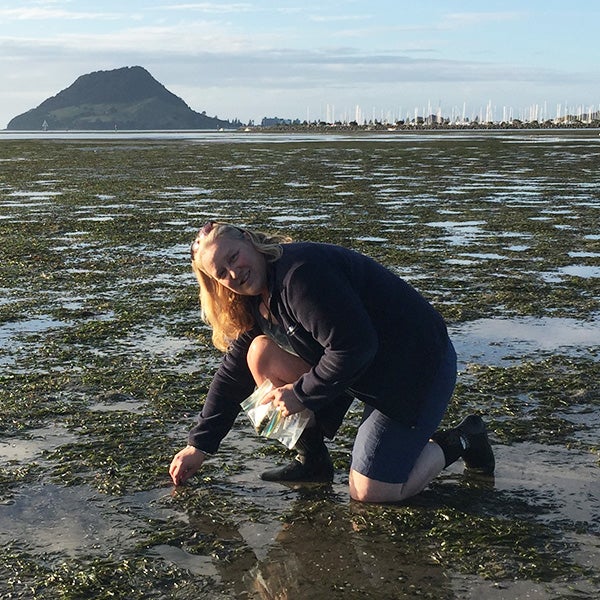Carolyn Lundquist, Ph.D. ’00, prompted by a high school career test, studied communication at UCLA, until an elective completely changed her path, leading her to eventually settle thousands of miles from her native California.
The course convinced her to switch to marine biology, a new offering at UCLA at the time. “It brought me back to the days when I was a kid playing in tide pools,” she said. Lundquist got her scuba diving license and enrolled in the “Marine Biology Quarter” field course at the UC Davis Bodega Marine Laboratory. She applied for the ecology program there soon after and started her Ph.D. a week after her UCLA graduation. Originally from the Bay Area, Lundquist has moved from the West Coast of California to New Zealand, where she is now an established marine biologist and professor at the University of Auckland.
Lundquist’s discipline of focus was wildlife and conservation biology, but she also studied environmental science and policy, plant ecology, viticulture and enology, and more. “The collaborations across the different disciplines really connected me to people that I worked with later in my career, but also influenced how I worked quite a bit,” she said.

Lundquist said she still does research and keeps in touch with many of her former classmates from UC Davis, she said. She was also introduced to visiting researchers and professors from other universities at seminars hosted at Davis, one of which connected Lundquist to her current job in New Zealand.
After graduating from UC Davis in 2000, a connection to a researcher from the University of Auckland led her to the National Institute of Water and Atmospheric Research, or NIWA, in New Zealand, a national research institute that specializes in climate, freshwater, and marine scientific research and does environmental consulting for government and industry. Lundquist said she expected to be there one or two years. “It didn't seem like a big move at the time. It seemed like, ‘let's go try somewhere fun,’” she said. Lundquist still lives there 24 years later, now with her husband and two teenage kids.
At NIWA, Lundquist is constantly working on many different projects, most of which study the impact of human activities on ocean ecosystems. This usually requires the compilation of many sets of data and constant communication with government agencies and any other involved groups. As a senior researcher at the company, she also regularly leads multimillion-dollar grant proposals.
Ten years ago, a joint graduate school was formed between NIWA and the University of Auckland. A position opened for NIWA employees to work at the university once a week, and out of 700 NIWA staff, Lundquist got one of the six slots available. She now teaches marine conservation courses and advises a sizable group of graduate students at the University, as well as many early career researchers at NIWA. Lundquist said her work at the university is her favorite part of her job and a welcome relief from the fast-paced, often commercialized work at NIWA. “It's like a Ph.D. every three months in terms of the amount of work we probably deliver,” Lundquist said.
In addition to her work at NIWA and the university, Lundquist is on the United Nations IPBES biodiversity expert panel and leads their task force on scenarios and models of biodiversity. Lundquist said she plans to continue working for the betterment of the environment and aims to achieve this through her many projects. “I do a lot of side work, and my passion is, how do we actually have a global effect on improving the world we live in?” Lundquist said.
